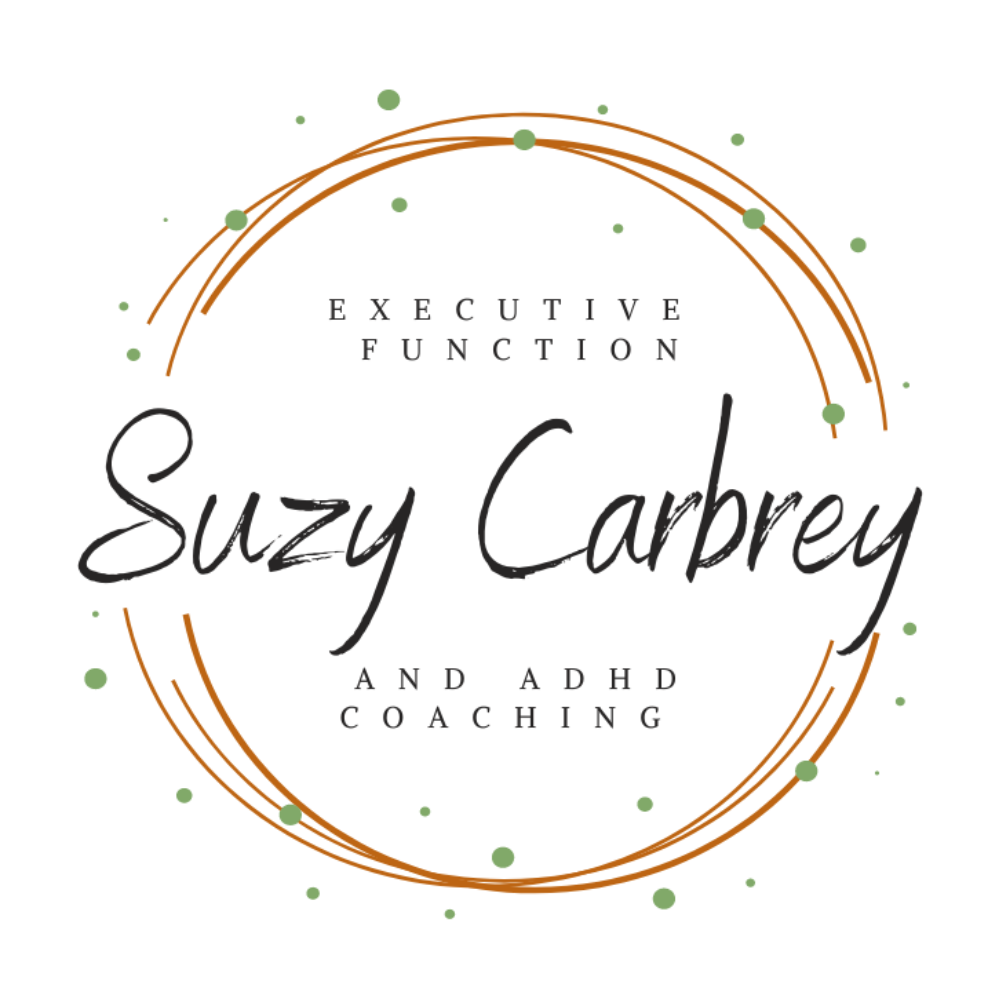Stress and anxiety are common experiences for parents and professionals alike, often stemming from the pressures of managing work, family, and personal obligations. For individuals with executive functioning challenges, these emotional states can create significant roadblocks to productivity and well-being. This post explores how stress and anxiety impact executive functioning and provides actionable strategies to mitigate their effects.
What Is Executive Functioning?
Executive functioning refers to a set of cognitive processes that help us manage our thoughts, actions, and emotions. These skills include planning, organizing, time management, emotional regulation, task initiation, and working memory. For parents and professionals juggling multiple responsibilities, strong executive functioning is crucial for navigating daily life effectively.
However, stress and anxiety can disrupt these processes, making it harder to stay on track. Understanding this relationship is the first step toward finding solutions.

How Stress and Anxiety Affect Executive Functioning
Stress and anxiety impact the brain in ways that directly impair executive functioning:

- Working Memory: Stress hormones like cortisol can interfere with working memory, the cognitive skill that allows you to hold and manipulate information temporarily. This is why you might forget important appointments or struggle to follow multi-step instructions during high-stress periods.
- Mental Flexibility: Anxiety, on the other hand, often narrows focus and reduces mental flexibility. This means it can become challenging to adapt to new situations or brainstorm creative solutions when you’re feeling anxious. For parents trying to manage a household or professionals working on complex projects, this rigidity can lead to frustration and inefficiency.
- Decision-Making: Another common challenge is decision-making and prioritization. When stress overwhelms the prefrontal cortex—the part of the brain responsible for higher-order thinking—it becomes harder to decide what tasks are most important. This can result in procrastination or focusing on low-priority activities while avoiding critical ones.
- Emotional Regulation: Stress and anxiety also affect emotional regulation, making it easier to overreact to minor setbacks or feel paralyzed by a fear of failure. Over time, these emotional challenges can lead to avoidance behaviors, such as putting off tasks that feel overwhelming.
- Physical Symptoms: Physical symptoms of anxiety, such as headaches, muscle tension, or fatigue, add another layer of difficulty by distracting from the cognitive effort needed for effective executive functioning.
Recognizing these patterns is essential to addressing them effectively.
Signs Stress and Anxiety Are Impacting Your Executive Functioning
You may notice:
- Increased forgetfulness
- Difficulty following through on plans
- Feeling scattered or unfocused
- Avoiding tasks that feel overwhelming
- Emotional overreactions to minor setbacks
- Trouble making decisions or second-guessing choices
- Persistent fatigue, headaches, or trouble sleeping
If these resonate with you, consider strategies to address these challenges.
Strategies to Manage Stress, Anxiety, and Executive Functioning Challenges
To reduce the impact of stress and anxiety on your executive functioning, it’s important to adopt practical, supportive strategies. Let’s dive deeper into some of the most effective approaches:
One powerful tool for managing stress is mindfulness. Practices like deep breathing exercises, progressive muscle relaxation, or guided meditation help calm the mind and reduce the physical symptoms of stress. These techniques work by lowering cortisol levels, which can restore clarity and improve focus. Apps like Calm or Headspace can provide guided exercises to get you started.
Breaking large tasks into smaller, manageable steps can also alleviate anxiety. When faced with an overwhelming to-do list, try focusing on just one small action you can take. For instance, if you’re tackling a big project at work, start by outlining the first few steps rather than trying to plan the entire process at once. This approach makes tasks feel more achievable and creates a sense of progress that can motivate you to keep going.

Creating predictable routines is another effective way to reduce stress. By establishing consistent habits, such as starting your day with a brief planning session or setting aside specific times for meals and exercise, you can reduce decision fatigue and create a sense of stability. Routines act as mental anchors, freeing up cognitive resources for more demanding tasks.
Externalizing information can be a game-changer for individuals with executive functioning challenges. Instead of relying on your working memory to keep track of appointments, deadlines, or grocery lists, use tools like calendars, planners, or digital apps such as Todoist. Writing down reminders and placing them in visible locations, like sticky notes on your desk, ensures you won’t forget important details.
Perfectionism often fuels anxiety, so it’s crucial to address this mindset. Practice self-compassion and remind yourself that “done is better than perfect.” For example, if you’re hesitant to send an email because it’s not perfect, focus on getting your main point across rather than agonizing over every word.

Setting boundaries and learning to say no can significantly reduce stress. Overcommitting is a common pitfall, especially for parents and professionals trying to balance multiple roles. Before agreeing to new responsibilities, take a moment to evaluate whether they align with your priorities. Phrases like, “Let me check my schedule and get back to you,” can buy you time to make thoughtful decisions.
Physical well-being plays a significant role in managing stress and supporting executive functioning. Regular exercise, even in short bursts like a 10-minute walk, can reduce stress and improve mood. Prioritizing adequate sleep—aiming for 7-9 hours a night—and maintaining balanced nutrition also contribute to better cognitive performance and emotional resilience.
Positive self-talk can help counter the negative thoughts that often accompany anxiety. Instead of telling yourself, “I’ll never finish this,” reframe the thought as, “I can take one small step at a time.” By challenging unhelpful narratives, you create a more supportive inner dialogue that boosts confidence and motivation.
If you’re feeling overwhelmed, don’t hesitate to seek support. Talking to a trusted friend or joining a support group can provide perspective and encouragement. Professional help from a therapist or executive functioning coach can also offer tailored strategies to address your unique challenges.
Gratitude practices are another way to shift focus away from stressors. Reflecting on the positive aspects of your life, whether by keeping a gratitude journal or sharing daily highlights with a family member, can help you maintain a balanced perspective.
Building Resilience for Long-Term Success
Managing stress and anxiety isn’t just about addressing immediate concerns; it’s about building resilience for the long term. Developing emotional awareness is a foundational step. By recognizing and naming your emotions, you can better understand what triggers stress and how to respond constructively.
Cultivating a growth mindset—the belief that challenges are opportunities to learn and grow—can also reduce anxiety about failure. For instance, if you’re worried about making a mistake at work, remind yourself that every experience, even setbacks, contributes to your development.
Planning for stressful periods can help you stay ahead of potential overwhelm. For example, if you anticipate a busy week, prepare by delegating tasks, meal prepping, or setting aside time for relaxation. Small actions taken in advance can prevent larger issues later.

Celebrating small wins reinforces a sense of accomplishment and builds confidence. Even minor achievements, like organizing your desk or completing a simple task, deserve recognition. Over time, these moments of success accumulate, creating momentum.
Finally, deliberate rest is crucial for maintaining long-term executive functioning. Schedule downtime to recharge, whether it’s a leisurely walk, reading a book, or spending quality time with loved ones. Remember that rest isn’t a luxury—it’s a necessity for sustainable productivity.
When to Seek Professional Help:
- Persistent Overwhelm: If feelings of stress or anxiety are ongoing and feel unmanageable, even with self-help strategies.
- Sleep Issues: If you are having difficulty falling asleep, staying asleep, or experiencing disrupted sleep due to anxiety or stress.
- Physical Symptoms of Anxiety: If you notice physical symptoms like a racing heart, dizziness, muscle tension, or frequent headaches, which may be linked to anxiety.
- Inability to Cope: If stress and anxiety start to interfere with your daily life, making it difficult to focus, complete tasks, or maintain your usual routine.

A therapist, counselor, or ADHD/executive functioning coach can offer personalized tools, strategies, and support to manage anxiety and stress more effectively. They can also help you build coping mechanisms tailored to your unique situation.
Reflect, Take Action, and Empower Yourself
Stress and anxiety are unavoidable aspects of life, especially for parents and professionals managing competing priorities. However, they don’t have to control your ability to function effectively or pursue your goals. By understanding their impact on executive functioning and embracing strategies to reduce their influence, you can reclaim clarity, focus, and emotional balance.
Take a moment to reflect on your own experiences with stress and anxiety. Which areas of your executive functioning feel most affected? Do you find it harder to stay organized, follow through on plans, or regulate emotions? Acknowledging these patterns is the first step toward change.
Now, consider which of the strategies outlined resonate with you most. Would introducing a daily mindfulness practice help you feel grounded? Could breaking down a daunting task or creating a predictable routine make your responsibilities feel more manageable? Start with just one or two small changes and observe the difference they make.
Action is where transformation begins. Commit to taking one specific step today, whether it’s downloading a mindfulness app, setting a boundary, or externalizing your tasks into a planner. Write it down, set a reminder, and follow through—knowing that even small adjustments can lead to meaningful progress.

Lastly, embrace a mindset of self-compassion and curiosity. Stress and anxiety are natural responses to life’s challenges, but they don’t define your capabilities. Celebrate your efforts and small wins along the way, and view setbacks as opportunities to learn and refine your approach.
Remember, you don’t have to navigate this journey alone. Whether it’s leaning on friends, family, or professional support, asking for help is a sign of strength. By taking proactive steps to manage stress and anxiety, you’re not just enhancing your executive functioning—you’re building a foundation for resilience and success in every area of life.
Learn more with Online Coaching for Executive Functioning / ADHD
Ready to gain control and enhance your executive functioning? As an experienced and compassionate coach, I specialize in providing support for executive functioning and ADHD. To embark on your journey, please reach out to me at 708-264-2899 or email hello@suzycarbrey.com to schedule a FREE 20-minute discovery call consultation.
With a background as a speech-language pathologist, I have a strong foundation in executive functioning coaching. My graduate degree program in SLP placed a significant emphasis on cognition, including executive functions, and I have years of experience in medical rehabilitation, providing cognitive-communication therapy. Additionally, I have completed an ADHD Services Provider certification program, I am Solutions-Focused Brief Therapy Diamond Level 1 certified and I am trained in the Seeing My Time® executive functioning curriculum.
Experience the convenience and effectiveness of online coaching, backed by studies that demonstrate equal results to in-person services. Parents, professionals, and emerging adults love the convenience and privacy of receiving coaching from their own homes.
Whether you reside in Chicago, Milwaukee, Indianapolis, Kansas City, or anywhere else around the globe, I am here to assist you. Schedule your discovery call consultation today, and I eagerly anticipate the opportunity to work with you!
Please note that although I am a certified speech-language pathologist, all services Suzy Carbrey LLC provides are strictly coaching and do not involve clinical evaluation or treatment services. If you require a formal speech therapy evaluation and treatment, please inform me, and I can provide appropriate recommendations.

